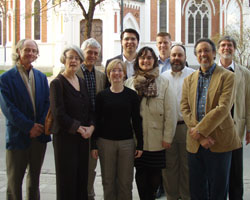 |
Dr. Becker with Jönköping International Business School faculty. |
Cox Center Researchers Tell Group at Meeting in Sweden: Data Show Limited Internet Impact on Labor Market
The introduction of the Internet has not yet had dramatic impact on the entry-level job market in the communication field in the United States, University of Georgia researcher Dr. Lee B. Becker told a meeting at a business school in Sweden in late May.
New communication employees are more likely to be using the Internet in their work than in the past, Dr. Becker said. In addition, major changes in the way journalism is practiced in the future as a result of the Internet could alter radically journalistic practice in the years to come.
Dr. Becker, who directs the Annual Surveys of Journalism & Mass Communication, was invited to the Jönköping International Business School in Jönköping, Sweden, to participate in a two-day discussion of the impact of technological change on journalistic organizations and journalistic work.
Researchers from Jönköping International Business School, from Södertörn University College in Sweden, from Goldsmith College in the U.K, and from the University of Texas and the University of Oklahoma in the U.S. also attended. Dr. Jane Singer from the University of Central Lancaster in the U.K. joined the discussion via a video link.
Drawing on data from the Annual Survey of Journalism & Mass Communication Graduates, Dr. Becker said there was little evidence that the basic features of the entry-level labor market had changed in the years since the Internet had been introduced.
The level of employment of journalism and mass communication graduates had mirrored employment in the U.S. labor market generally, he said. Workers remain largely satisfied with their work and with the preparation they have received for that work as a result of their university studies.
About four in 10 of those who found work in the field of communication in 2006 and 2007 reported doing writing and reporting for the web–an increase from two in 10 only two years earlier. And 63% of the graduates in 2006 reported using the web for research associated with their work.
Entry-level employees in journalism were more likely to report and write for the web than were entry-level employees in advertising and public relations, Dr. Becker said, but the newly employed advertising and public relations workers were more likely to do promotional work using the web and more likely to use the web for advertising.
“The Internet clearly is important for all new workers in communications,” Dr. Becker said.
Dr. Becker warned the group it is important not to “exaggerate at present the nature of change in news work and news organizations that has taken place,” but he also said “we should not underestimate the nature of change that may take place in the not-so-distant future.”
If journalism becomes “decoupled” from media organizations and is practiced extensively by people independent of those organizations, Dr. Becker said, “news work may well be radically
transformed” in years to come.
The Annual Surveys of Journalism & Mass Communication are housed in the James M. Cox Jr. Center for International Mass Communication Training and Research, a unit of the Grady College of Journalism and Mass Communication at the University of Georgia.
Dr. Becker is director of the Cox Center. He and Dr. Tudor Vlad, associate director of the Cox Center, have primary responsibility for the Annual Surveys of Journalism & Mass Communication. Dr. Vlad was co-author of the paper presented by Dr. Becker, but he did not attend the meeting because of another travel commitment.
The group gathered at the Jönköping International Business School at the invitation of Dr. Robert Picard, director of the Media Management and Transformation Centre. The Media Management and Transformation Centre has a primary responsibility to generate knowledge about the communication industries, Dr. Picard told the gathering in the introductory session.
The goal of the April 28 and 29 workshop was to outline what is known and what is not yet known about the impact of technological change on journalistic work and on the organizations where that work takes place.
Other participants were: Benjamin Hartmann and Elena Raviola from the Media Management and Transformation Centre, Peter Gade from the University of Oklahoma, Gunnar Nygren from Södertörn University College, Tamara Witschge and Angela Philips from Goldsmith College at the University of London, George Sylvie from the University of Texas, Picard and Singer.

